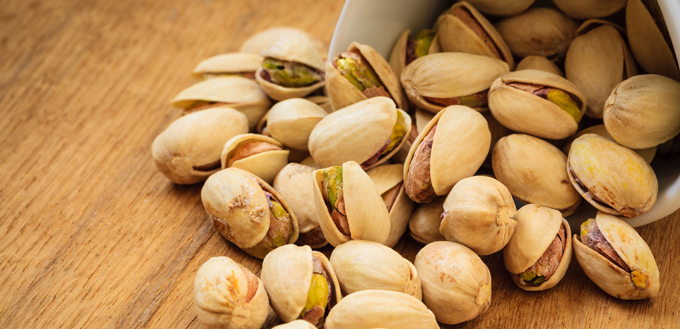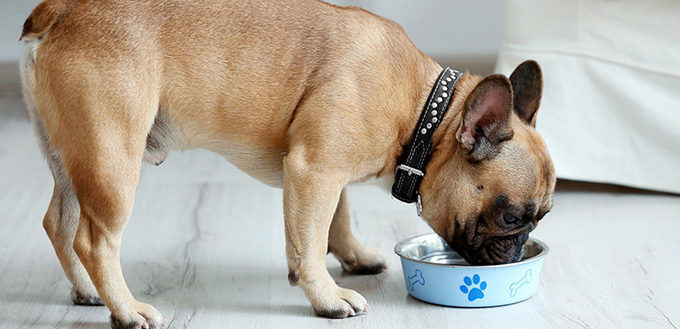Everyone knows just how much dogs love peanut butter for treats. As a matter of fact, many dog trainers recommend giving our pooches with peanut butter treats. If dogs love peanut butter, then is it safe to say that they can readily eat other kinds of nuts like pistachios? Even before you start giving pistachios to your mutt as a snack, you might want to read this first.

Nutrient Profile of Pistachios
We all love to share whatever we have with our beloved pets, especially food. And since we’re talking about nuts it is but natural to ask whether it is safe to give our mutts pistachios. Before we answer this question, let us first have a look at the nutrient profile of this type of nut.
A gram of pistachio typically contains about 55.7 Kcal consisting of 2.79 grams of carbohydrates, 2.06 grams of proteins, and 4.44 grams of fat, plus 1.03 grams of dietary fiber. This gives pistachios a very energy-dense profile. As if its carbohydrate content is not enough to supply the energy needs of your pooch; its fat content helps make sure your dog will get a real burst of energy when needed.
Unfortunately, this is where the major concern lies. Imagine giving your pooch a hundred grams of this nut and you’re essentially giving it 44.44 grams of fat, way higher than its 27.97 grams of carbs and 20.6 grams of protein.
The good thing is that the fat content of pistachios included monounsaturated fatty acids that are well-known for their antioxidant and anti-inflammatory properties. This type of fatty acids is also highly regarded for lowering bad cholesterol levels while increasing the levels of good cholesterol. And while dogs are not really that prone to the development of cardiovascular events, ensuring they have a healthier blood lipid profile means you have one less problem to worry about.
Beyond the fatty profile of pistachios, you’re also giving your dog a variety of micronutrients such as the following.
- Beta-carotene: This is a precursor of Vitamin A and is regarded for its antioxidant properties. This essentially leads to healthier coats and skin as well as giving your dog’s immune system a much-needed boost. Beta-carotene has also been shown to slow down cognitive decline so it can be exceptionally useful among senior dogs.
- Vitamin B complex: Pistachios are also rich in the B vitamins especially niacin, pantothenic acid, pyridoxine, thiamin, and riboflavin. These are important for a host of processes in the dog’s body, but more importantly in the metabolism of macronutrient molecules.
- Vitamin E: A well-known antioxidant, Vitamin E can bring a lot of goodness to your mutt’s skin and coat while also boosting its immune system. Its antioxidant properties work exceptionally well with Vitamin A and beta-carotene.
- Calcium: We all know what calcium does for you. It’s important in the building and maintenance of healthier and stronger bones while also involved in a host of other bodily processes including muscle contraction.
- Copper: The role of copper in the canine body is found in the more efficient production of red blood cells, the maintenance of the optimal functioning of the nerve cells, and the enhancement of immune system cellular functioning.
- Iron: When we talk of iron, we always talk about oxygen in the blood. Iron is needed in the formation of hemoglobin, a transport protein that carries oxygen to the tissues and removes carbon dioxide for elimination.
- Magnesium: One of the key functions of magnesium is to regulate the blood levels of potassium, sodium, and calcium, all important minerals in establishing balance in the body. It also helps soothe muscle spasms so your dog won’t have to lie down hurting after a long day walking and running in the park.
- Manganese: This mineral helps make sure that the central nervous system is functioning optimally. It is also important in the production of connective tissues, blood clotting factors, bones, and even sex hormones.
- Zinc: Boosting the immune system is one of the inherent actions of zinc. As such, giving this micronutrient should help enhance the antioxidant and immune-boosting abilities of pistachios.
- Selenium: Another antioxidant is selenium. This can provide synergistic effects with zinc, copper, vitamin E, and vitamin A in pistachios.
- Phosphorus: Calcium is not the only mineral needed for healthier and stronger skeletal system. Phosphorus is also important especially in the maintenance of bone structure, density, and integrity. It’s important in optimum cognitive functioning, too.

Not Too Much Pistachio
Based on what we have been discussing so far, we can all agree that pistachios are excellent sources of antioxidants, anti-inflammatories, and immune system-boosting nutrients. It is rich in proteins and monounsaturated fatty acids, too.
Unfortunately, as we have already mentioned, this is where the problem lies. Since pistachio contains 44.4 grams of fat, veterinarians and animal experts are quite cautious when it comes to giving our pooches exceptionally large amounts.
On hindsight, a hundred grams of unsalted, raw peanuts actually contain more fat at 49.2 grams. That said, we can say that pistachios have a much lower fat content than peanuts which we all give to our pooches in the form of peanut butter.
You May Also Like: Dog Safe Peanut Butter Treats
In addition to its high fat content, you’re also not supposed to give pistachio to your dog unshelled or with its shell still intact. These parts of the nut are hard and they can be splintered. For smaller dogs, the problem can be intestinal obstruction. So, if you do decide to give your pooch pistachio, make sure to remove the meat from the shell and give only the meat. Also, avoid adding flavoring, seasoning, or any other ingredient. You’re not supposed to butter it, too. Remember, it’s high in fat as it is.
Is it okay to give pistachios to dogs? Yes, by all means. However, you are not supposed to make it as part of your dog’s regular diet. Like peanuts and peanut butter, these should only be given as treats. And wherever treats are involved, they shouldn’t comprise more than 10 percent of your pooch’s daily diet. Also, make sure to remove the shell and never add anything else.
Sources:
- Dr. Amanda Ardente, Can Dogs Have Nuts?, PetMD
- Pistachio Poisoning in Dogs, Wag!






